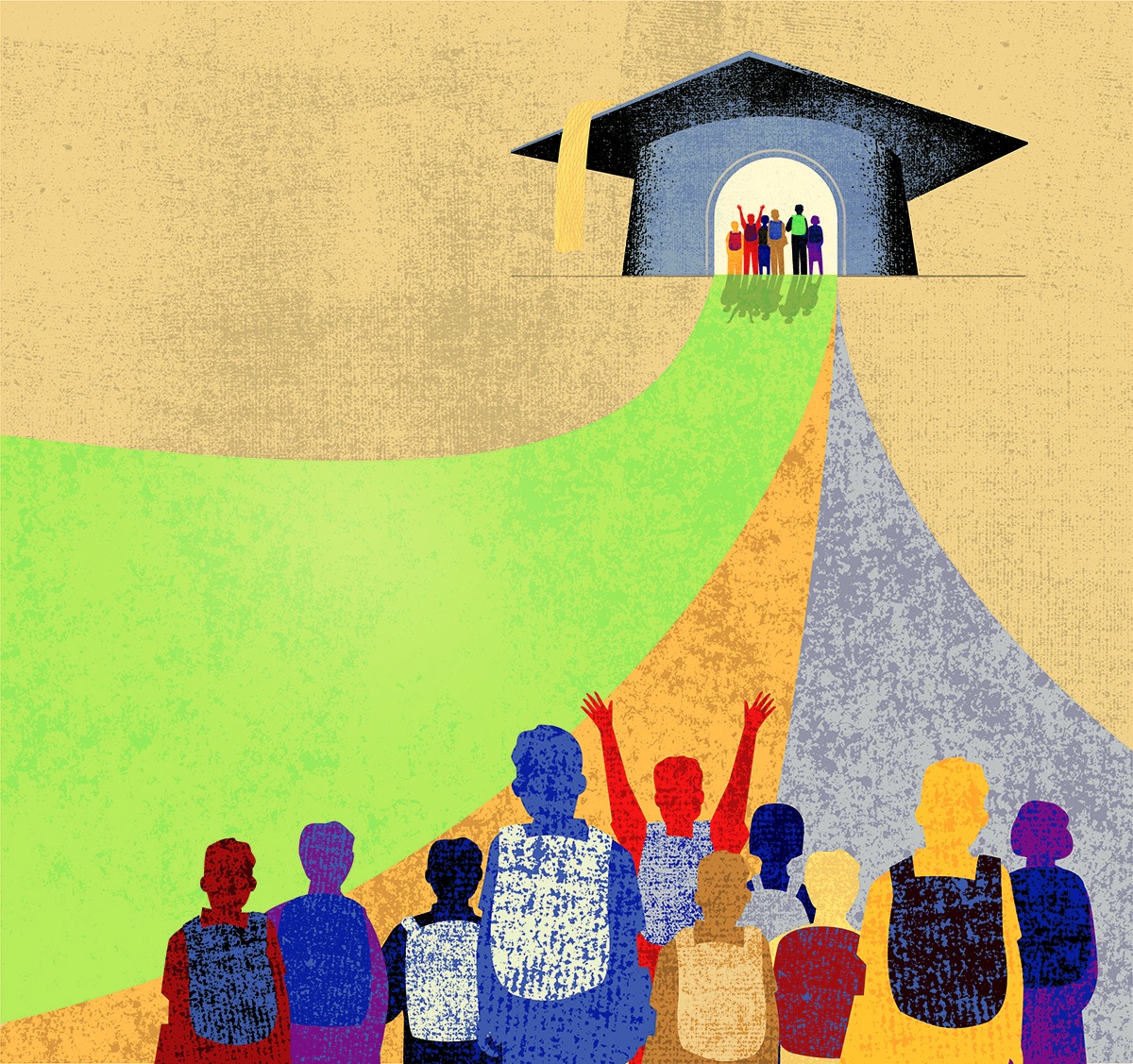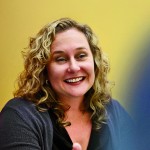For too many, the dream of a college degree remains just that — a dream. For others, college isn’t even contemplated. Lacking preparation, inspiration and the necessary resources, far too many young people do not even consider obtaining a college degree as part of their life plan. The issue of closing that gap — of making higher education affordable and accessible regardless of a prospective student’s background — remains one of the nation’s greatest challenges. It is also a high priority at Washington University in St. Louis.
For generations, Washington University has offered scholarship opportunities and other assistance programs to bring within reach an educational experience at one of the nation’s top research institutions. Progress has been made. However, there is no one silver bullet. A broader, long-term, sustained effort is required to level the playing field for prospective students and achieve socioeconomic diversity within the university’s overall student body.
Underscoring just how significantly this challenge permeates society, in January, President Barack Obama hosted a White House Summit on Higher Education, inviting presidents from more than 100 colleges and universities to participate in a thoughtful, collective conversation about what more can be done. The leaders agreed: Something must be done to attract and retain students of all backgrounds. Many institutions promised to increase financial aid, some pledged to step up outreach efforts, and others declared they would do more to retain students.
Chancellor Mark S. Wrighton shared that at Washington University he is addressing all of those critical mission needs. He shared with participants the university’s three-pronged approach to making education affordable and accessible to high-achieving students of all backgrounds and ensuring individual success for every student who attends.
• PRONG ONE – Strengthen the pipeline of well-prepared and inspired students. Washington University has a long history of collaborating with local schools to develop well-prepared and inspired learners. Since 2008, Washington University has served as a hands-on sponsor to KIPP Inspire Academy, a high-performing charter school serving low-income students. Based on the school’s success, the university has committed to support a network of KIPP schools, including a new elementary school slated to open this summer. Wrighton also announced that the university would sponsor the Hawthorn Leadership School for Girls, the first all-girls STEM (science, technology, engineering, mathematics) charter in St. Louis.
Washington University also will launch a new pre-college program that will prepare first-generation high school students for college. And the university has joined forces with two more college-access programs: the National College Advising Corp and Say Yes to Education.
• PRONG TWO – Make it possible to attend, regardless of ability to pay. Already, about half of Washington University’s undergraduate students receive some form of financial assistance. To increase opportunities for scholarship support, Chancellor Wrighton announced that Washington University would increase, for the second time, its Leading Together capital campaign goal for scholarships. The new goal is $400 million, $250 million more than the original goal.
Wrighton and Provost Holden Thorp also committed resources to recruit, retain and graduate more Pell-eligible enrollees beginning with this fall’s incoming class. This pledge complements the university’s no-loan program, which ensures freshmen from families with an annual income of less than $75,000 receive financial aid packages with no loans.
• PRONG THREE – Empower students once they arrive, enabling them to succeed in college and beyond. With a graduation rate that ranks with the very best anywhere, Washington University recognizes that it is not enough to recruit top students. The real measure of success must be seeing these students graduate and succeed in their careers. Mentoring, internship stipends, book and travel stipends, and other hands-on, personalized programs are available to students who could benefit from the support.
This comprehensive approach will help develop future generations of strong, inspired and motivated students.
In many ways, Washington University already is leading the nation in these efforts. It boasts one of the highest graduation rates in the country, and low-income and first-generation students graduate at essentially the same rate as their peers.
Washington University also offers top scholarship opportunities. The Enterprise Holdings, John B. Ervin, James E. McLeod and Annika Rodriguez scholars programs have drawn outstanding applicants who enhance the quality and diversity of the student body.
Washington University, through its personalized approach to student aid, also is among the few top colleges and universities that have actually lowered the net cost of tuition for the lowest-income students.
Still, more must be done. It will take smarts and grit … and resources. But the payoff is huge. Just look at the lives changed, the careers launched at Washington University. Here, Washington introduces you to students — former, current and perhaps future — who demonstrate how more access to education benefits us all.
Preparing, inspiring K–12 students for college
Washington University’s plan to boost socioeconomic diversity in higher education is to begin the process of developing scholars very early, beginning as young as fifth grade.
In 2008, Washington University signed on as sponsor of KIPP (Knowledge Is Power Program) Inspire Academy, a middle school in St. Louis serving low-income and minority students. As part of the sponsorship, WUSTL undergraduates tutor KIPP students; Brown School students assist KIPP’s social worker; and university faculty help KIPP teachers develop curricula. To succeed, though, students must work hard, spending more than nine hours in class most days, as well as attending classes on Saturdays and in the summer. Family support also plays a pivotal role in helping establish an atmosphere of trust and collaboration between stakeholders. By all indications, the partnership is paying off. Test scores keep climbing, and students are being accepted to some of St. Louis’ best college preparatory high schools.
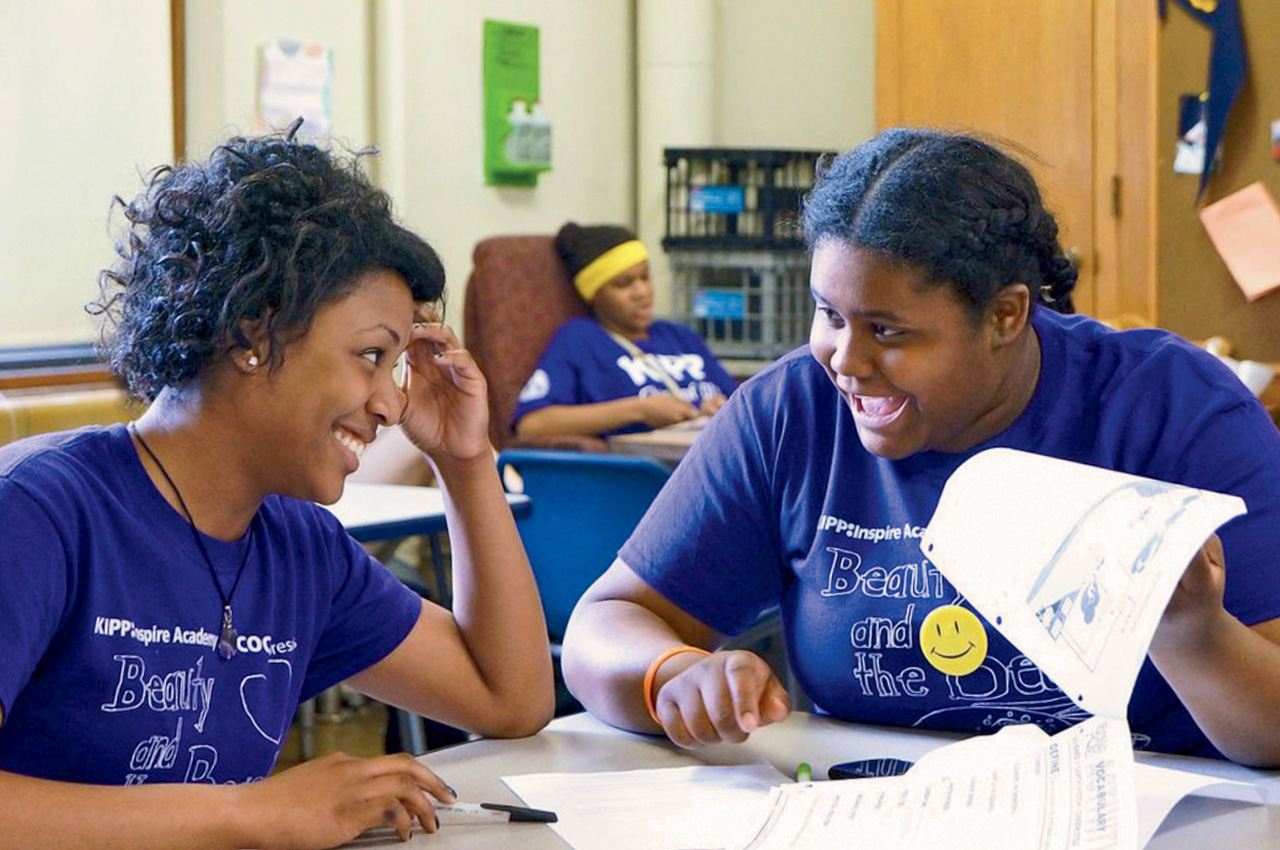
Phallen Briggs and Da’Nyjia Partee are two of the 72 bright young students forming KIPP’s first graduating class in 2013. Currently, they are freshmen at Metro Academic and Classical High School in the city of St. Louis. Metro consistently ranks among the top 150 public high schools in the country and is rated No. 1 among public high schools in Missouri. The two are adapting well and succeeding in their freshman year.
For Da’Nyjia, planning was one of the essential skills she learned during her time at KIPP. She says being organized is what keeps her focused.
“We had this phrase: ‘Climb the Mountain to College,’ and we learned that everything you do is building a foundation toward college. Going to KIPP, coming to Metro High School — this is helping me succeed, helping me get to where I want to be: WashU, CalTech, MIT, anywhere.”
Phallen Briggs
“At KIPP, we had a planner, and we had to write in it,” Da’Nyjia says, “but now I have a lot more to do, and it’s not like I’m being reminded. I have to remember what to do on my own.”
For both students, the rigor and discipline of KIPP prepared them well for high school and encouraged them to think beyond to college.
“We had this phrase: ‘Climb the Mountain to College,’” Phallen says, “and we learned that everything you do is building a foundation toward college. Going to KIPP, coming to Metro High School — this is helping me succeed, helping me get to where I want to be: WashU, CalTech, MIT, anywhere.”
“Both Phallen and Da’Nyjia exude a maturity that is unmatched,” says Molly Joyce, director of high school placement for KIPP Inspire Academy. “They are really proud of where they come from, they are really proud they go to Metro, and they are really proud they do well. I don’t think there is anything more you could ask of a 14- or 15-year-old but to be proud of what they are doing academically. And, as long as they have that now, they will never accept not doing well.”
The two young ladies also appreciate all they learned at KIPP and the exposure they got to Washington University tutors. For example, both participated in the Science Olympiad, a national program that, at KIPP, is sponsored by WUSTL’s Institute for School Partnership (ISP). WUSTL engineering school faculty and students meet with students on Saturdays, where they work on teams and try to solve science problems. Phallen says the attention-grabbing categories — such as rotor egg drop, metric mastery, disease detective and crime busters — reinforced the science they were learning in their KIPP classes or at times foreshadowed what they were to learn.
Da’Nyjia also takes part in Strive for College — founded by WUSTL alumnus Michael Carter, AB ’10. A national organization, Strive for College pairs high school students with college-access mentors for help with college applications, advice on scholarships and other guidance.
Because students from disadvantaged backgrounds and their parents often lack the requisite experience to navigate the process, this program and others are crucial to helping students into college. To that end, the university recently joined forces with the National College Advising Corp and Say Yes to Education.
Overseeing the university’s broad commitment to advancing K–12 activities, including its sponsorship of KIPP, is the Institute for School Partnership, directed by Vicki May. The institute is interdisciplinary and has an overall goal of enhanced student development and success.
In addition to new initiatives in campus-wide coordination, school leadership and community school reform partnerships, ISP carries on the efforts of Science Outreach, a program with a 20-year history of improving learning in science, technology, engineering and mathematics through hands-on, investigative teaching methods.
ISP places priority on working with neighboring school districts in underserved communities, and many of its programs are national models for teacher professional development.
Of ISP’s many partnerships, the Hazelwood School District collaboration stands out as a great example of success. Over the course of a five-year (and counting) collaboration with ISP, Hazelwood (an 18,000-student district in north St. Louis County) has helped students dramatically improve their science scores on the Missouri Assessment Program tests. Specifically, since 2008, fifth-graders’ scores in science have increased 22.4 percentage points, and eighth-graders’, 12 percentage points.
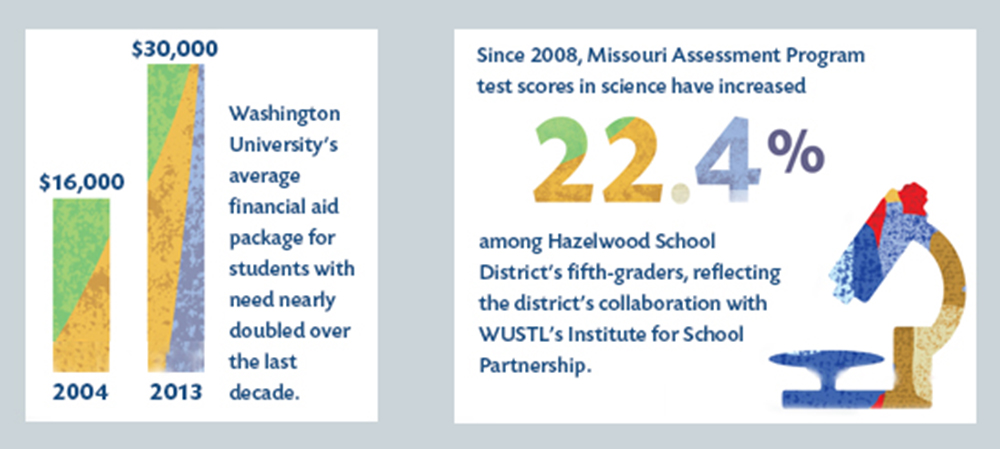
For the Hazelwood district, ISP’s approach is multifaceted and includes on-site professional education for teachers; WUSTL faculty and staff serving as a constant resource; and university-provided curriculum materials and kits.
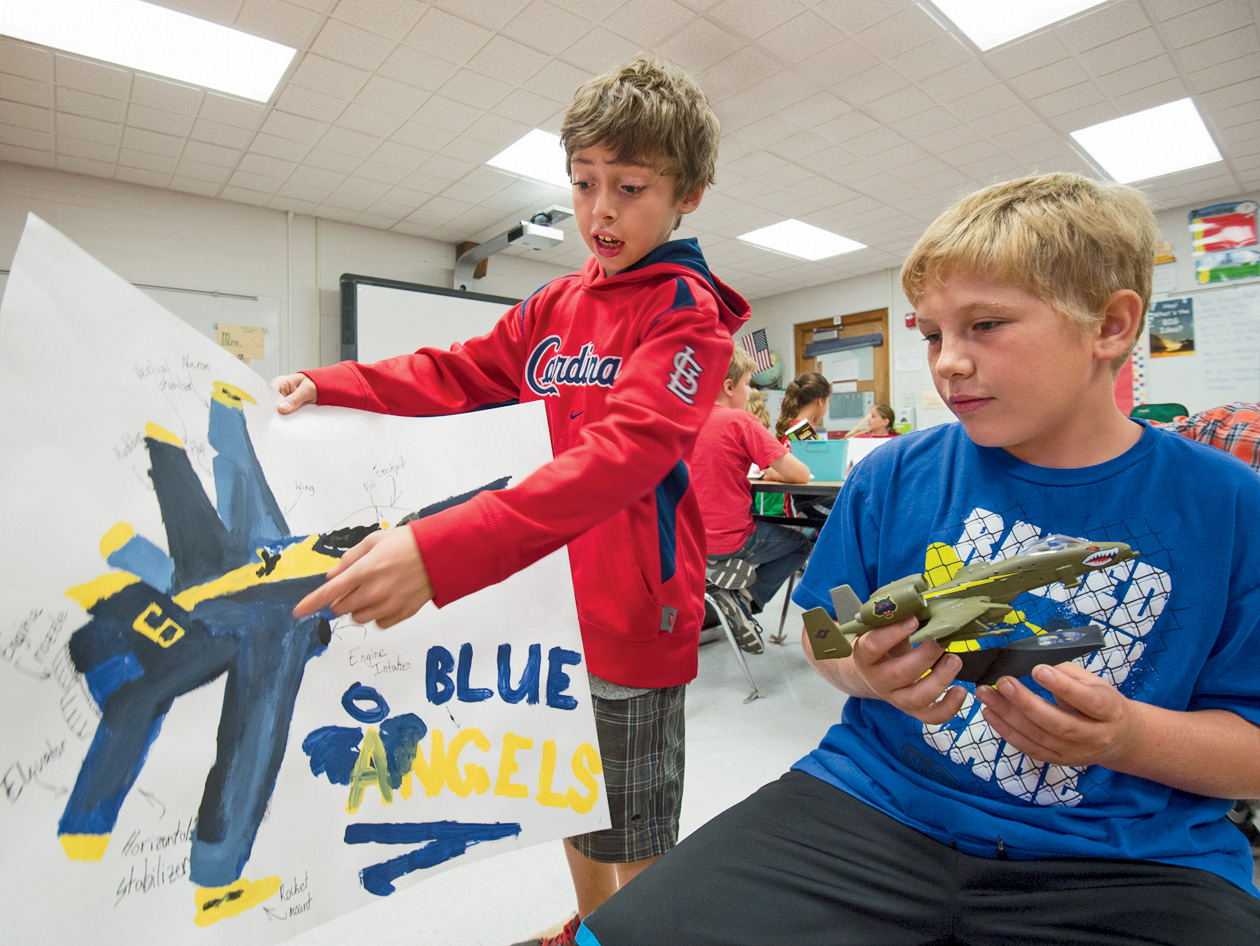
“Hazelwood wanted an exemplary science program and was committed to putting the support structure in place to make it happen,” says May, who is also an assistant dean in Arts & Science. “They just needed the spark, and we were willing to provide it.”
The university recently announced two new initiatives that aim to strengthen further the pipeline to college for students in underserved populations: the Hawthorn Leadership School for Girls and the Summer College-Prep Program.
Since women are underrepresented in STEM fields and minority girls even more so, Washington University is working to close the gender gap through its sponsorship of Hawthorn Leadership School for Girls, St. Louis’ first all-girl charter school. Hawthorn is affiliated with the highly successful Young Women’s Leadership Schools and will serve girls in grades 6 through 12. The goal: to get every graduate into college. The school will open in fall 2015 with sixth- and seventh-grade classes and will add a class each year.
In summer 2014, Washington University will launch the Summer College-Prep Program to prepare talented low-income high school students for college life. Twenty rising sophomores will spend two weeks on campus, where they will live in residence halls, take classes, and develop the skills needed to live on their own. The students will return the following two summers and also receive college guidance throughout their remaining high school years. By providing an experience that is both intensive and continuous, the university is upping these students’ chances of success.
Financial assistance makes college possible
Even with the best preparation — and a golden acceptance letter — students from low-income families have a particular struggle in paying for education at a selective university. Scholarships fill the gap for a large number of students.
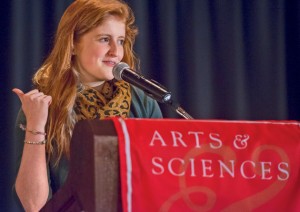
When Rose McCarty, Arts & Sciences Class of ’14, received her generous financial aid award in the mail, she cried. The Ann Rubenstein Tisch Scholarship made her attendance at Washington University possible. “I cried because I had never felt so validated,” McCarty recalls.
In the spirit of giving back, as a freshman, McCarty hit the ground running, volunteering at the Juvenile Detention Center in St. Louis. Hanging out with the kids, she fell in “love with the environment” and at that time decided to pursue an educational path to serve them.
“During my entire college career, I have spent a significant amount of time at the St. Louis Juvenile Detention Center,” McCarty says. “This has been the sole constant through my changing majors and varying career plans. My time with these kids is something I wouldn’t give up for anything, because they exposed me to a world most of us never have to experience.”
Among her other activities, the urban studies major has served two years as a resident advisor and has volunteered with Innovative Concept Academy, which is dedicated to the education and rehabilitation of delinquent teens and is the only school in the United States overseen by a court system. During her senior year, she was awarded a Goldman Fellowship through the Gephardt Institute for Public Service, which allowed her to work at an unpaid internship with Legal Services of Eastern Missouri.
McCarty now has her sights set on graduate school and the pursuit of a joint degree in law and social work. And she is just one of the hundreds of exceptional students who receive scholarships to Washington University.
In an effort to expand scholarship opportunities for even more students, the university recently increased its goal of raising funds for scholarships through the Leading Together capital campaign. Initially set at $150 million, the goal was later raised to $330 million.
Now, the university is working to secure $400 million to better support undergraduate and graduate students with financial need.
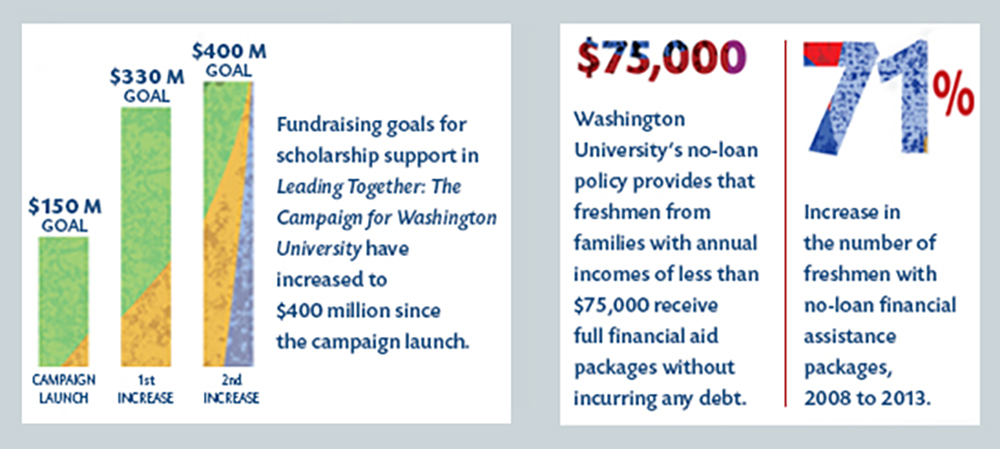
“A great education is a transformative experience. It develops leaders with depth of understanding and strength of character, committed to using their education to benefit humanity,” Chancellor Mark S. Wrighton says. “This extraordinary opportunity must continue to be accessible to every qualified student who aspires to graduate from Washington University.”
Among the many scholarship opportunities at Washington University, the Enterprise Holdings, John B. Ervin, James E. McLeod and Annika Rodriguez Scholars programs help specifically to attract outstanding applicants who enhance the quality and diversity of our student body.
“He placed both of his hands on my shoulders, looked me directly in the eyes and said, ‘Son, we want you to go to college, but you will have to earn a scholarship because we cannot afford it.’”
Jeff Nelson
Take Jeff Nelson, BSAS ’10, a first-generation college student from a family of nine children. Without generous scholarship help, he would never have been able to attend Washington University. Nelson recalls when his father, a former telephone company repairman, took the then-15-year-old aside for a man-to-man talk.
“He placed both of his hands on my shoulders, looked me directly in the eyes and said, ‘Son, we want you to go to college, but you will have to earn a scholarship because we cannot afford it,’” Nelson says.
The former Student Union president, who worked hard to improve the day-to-day experience for all undergraduate students, earned three scholarships: the Enterprise Rent-A-Car Scholarship, the John B. Ervin Scholarship, and the Sandy Loewentheil Scholarship. Now an infrastructure quality engineer at Palantir Technologies in Palo Alto, Calif. — where he develops software solutions for the sectors of education, government and business — Nelson says his scholarships were key to helping him attend college.
Another way the university is opening pathways for exceptional students regardless of their socioeconomic or demographic background is through its no-loan policy. This program ensures that freshman students from families with an annual income of less than $75,000 receive full financial aid packages that involve no loans. This allows these students to graduate in four years, debt-free. Only a very small number of colleges and universities in the country have a similar offering.
Empowering students enables them to succeed in school and beyond
Washington University is committed to creating an environment where all students feel supported and welcomed. With assistance from on-campus programs and scholarship communities, students are empowered to succeed here and hereafter.
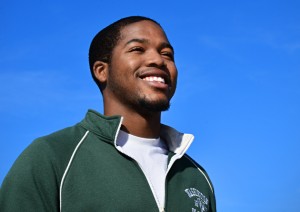
Senior Greg Opara considered Johns Hopkins Medical School a long shot. Harvard, too. And University of Rochester.
But one by one the letters arrived — all three medical schools wanted him to interview on campus. As did a dozen more. Opara was elated. Then reality hit.
“I realized there was no way I could afford to make these visits,” says Opara, the son of Nigerian immigrants. “If you don’t interview, you don’t get in, but there was nothing I could do.”
Opara turned to Ashley Gilkey, diversity in retention coordinator at Cornerstone, WUSTL’s Center for Advanced Learning. Gilkey used funds from the federal TRIO grant to fly Opara to four interviews. TRIO is just one of many university programs that serve low-income students, first-generation students and/or students with disabilities. TRIO also helps students buy books and supplies, travel home for holidays, and pay for expensive test-prep courses such as the Medical College Admission Test that Opara took.
“Greg’s done the hard work. He deserves this shot,” Gilkey says. “It would be a shame if he could not follow his dream because of a plane ticket.”
Opara may be surprised so many top-notch medical schools, including WUSTL’s School of Medicine, want him on campus, but his advisers aren’t. A standout student both inside and outside the classroom, Opara is majoring in psychology and minoring in biology in Arts & Sciences, and he has made the Dean’s List every year. Opara also has served as a residential advisor in Eliot Residential College for the past two years and has tutored third-graders in the Each One Teach One and Books and Basketball programs.
“He is an incredible model for the first-year students — serious about his academic pursuits and engaged in the campus community,” says Brian Carpenter, PhD, associate professor of psychology in Arts & Sciences and Eliot Residential College faculty fellow. “And he is a genuine friend to everyone.”
Gilkey and her colleagues at Cornerstone help many students like Opara through TRIO. Now in its 44th year at WUSTL, the program is among the nation’s most successful. One key measure — graduation — tells the story. Washington University already boasts one of the nation’s best six-year graduation rates: 94 percent. According to The Chronicle of Higher Education, that places WUSTL at No. 11 among top research universities. TRIO students graduate at an even higher rate: 97 percent.
“We’re here for them every step of the way, whether a student needs to talk about a family member back home or about adjusting to this environment.”
Ashley Gilkey
Gilkey credits the program’s emphasis on both academic and emotional support. The program has five advisers and a team of TRIO student leaders who guide students through their collegiate journey.
“We’re here for them every step of the way, whether a student needs to talk about a family member back home or about adjusting to this environment,” Gilkey says. “Maybe your roommate comes from a different background: How can you still live together and learn from each other? These are the sorts of questions we can help with. And they matter, because if you don’t feel connected to the students around you, it’s not going to matter how you do academically.”
For Opara, fitting in was easier than he expected. Certainly, many WUSTL students are affluent, but they also are open-minded, Opara says. He counts his freshman floormates among his closest friends. Still, his first year did pose some unexpected financial challenges.
“I never thought all these other expenses like books would be a problem until they came up,” Opara says. “It was a huge relief knowing TRIO was there, especially to help me get home during breaks. My brother calls me twice a week to ask about school and stuff. So, as the oldest sibling, being able to go home has meant so much to me.”
And being strongly supported by the university — whether financially, academically or otherwise — leads many WUSTL students and alumni into careers of service. A self-fulfilling cycle of achievement develops that can have far-reaching, positive impacts on individuals, communities and society.
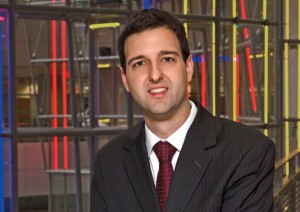
Fernando Cutz, AB ’10 (international and area studies; political science), is one such alum. Cutz is a Presidential Management Fellow at USAID, the federal agency that fosters health and human rights in more than 100 countries across the globe. Projects include battling malaria in Cambodia, introducing sustainable agriculture in Honduras, and opening schools in Afghanistan. And when war strikes, whether in South Sudan or Syria, USAID is there to protect victims from violence, hunger and disease.
“It’s easy to wake up in the morning and feel good about what you’re doing,” says Cutz, who also holds a master’s degree in public service from the Clinton School of Public Service, University of Arkansas. “The mission is so positive: We’re trying to help people. That’s the bottom line — always.”
USAID is just the latest — albeit the biggest stage — for Cutz. As an undergraduate at WUSTL, he was a passionate advocate for justice and equality. Along with Chase Sackett, AB ’10, Cutz co-founded U/FUSED (United for Undergraduate Socioeconomic Diversity), a national advocacy group devoted to increasing the number of low-income students going to college. And as senior class president, Cutz led the protest against the Chicago bar that refused to admit six black students during a senior class trip. Ultimately, the bar’s owners apologized and agreed to enroll workers in a diversity training class.
Cutz says the Enterprise Holdings Scholars and John B. Ervin Scholars programs motivated him to serve others.
“A core value of the Ervin program is to bring diverse communities together,” Cutz says. “I think my interest in diplomacy — especially in the development track I’ve been involved with at USAID — goes back to those values.”
Further, Cutz says he found a great community with his fellow Enterprise Scholars. “We were exposed to some awesome mentorship experiences by the folks at Enterprise Rent-A-Car,” he says.
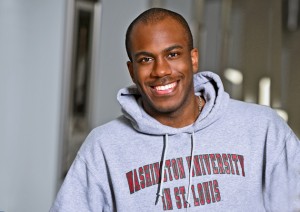
Cutz says the financial assistance that comes from being both an Enterprise Holdings and an Ervin scholar made it possible for him to attend Washington University. It also motivated him, as a graduate student at the Clinton School of Public Service, to start an outreach project to help low-income students in the Arkansas Delta go to college. That’s how he met Eddie King III.
“He was a role model in a place that didn’t have many,” Cutz says. “I knew he would make a great Ervin Scholar.”
King’s mother wanted a school with a good reputation for her son. King’s father, a pastor with little money, wanted a school with good scholarships. King agreed with them, but he wanted more — a school with a good community.
Growing up in Lilburn, Ga., King felt accepted and supported by his diverse group of friends. (“My sister called us the Rainbow Coalition,” King jokes.) But in the small Arkansas town where he had relocated, King felt marginalized.
“So the first thing I wanted to know when I visited was how do the communities and the micro-communities get along here,” King says. “What I found was a family-type atmosphere. I expected the community service and scholarship, but I didn’t expect that.”
King is a junior studying economics in Arts & Sciences and accounting in the Olin Business School. During breaks, he returns to Arkansas and encourages students to think big.
“Find your own strength and your own direction,” King says. “It’s not necessarily Washington University. Maybe it’s another college or a vocational school or the military. But find a way to help yourself so you can help your community.”
